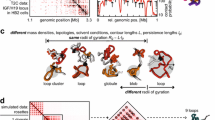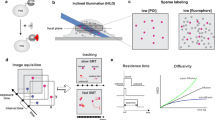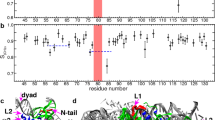Abstract
Eukaryotic chromatin is a complex of genome DNA and associated proteins, and its structure and dynamics play a crucial role in regulating DNA functions. Chromatin takes rather irregular structures in the nucleus and exhibits heterogeneous sub-diffusive movements as polymers fluctuating in a fluid state. Using genome-wide single-nucleosome tracking data, heterogeneity of movements was statistically analyzed, which categorized chromatin into two types: slow chromatin that moves under structurally constrained environments and fast chromatin that moves with less constraints. Interactions of chromatin to various protein factors determine the motional constraints. For example, loss of the cohesin complex that bundles the chromatin chains reduces the motional constraints and increases the population of fast chromatin. Another example is the transcriptional machinery. While it was previously thought that the transcriptional activity is associated with more open and dynamic chromatin structure, recent studies suggested a more nuanced role of transcription in chromatin dynamics: dynamic association/dissociation of active RNA polymerase II (RNAPII) and other transcription factors and Mediators (TF-Meds) transiently bridges transcriptionally active DNA regions, which forms a loose network of chromatin and constrains chromatin movement, enhancing the slow chromatin population. This new view on the dynamical effects of transcription urges a reflection on the traditional model of transcription factories and invites the more recent models of condensates/phase-separated liquid droplets of RNAPII, transcription factors, and Mediators. The combined procedure of genome-wide single-nucleosome tracking and its statistical analysis would unveil heterogeneity in the chromatin movement, which should provide a key to understanding the relations among chromatin dynamics, structure, and function.



Similar content being viewed by others
References
Ashwin SS, Nozaki T, Maeshima K, Sasai M (2019) Organization of fast and slow chromatin revealed by single-nucleosome dynamics. Proc Natl Acad Sci U S A 116:19939–19944
Bhowmik BP, Das R, Karmakar S (2016) Understanding Stokes-Einstein relation in supercooled liquids using random pinning. J Stat Mech 2016:074003
Bhowmik BP, Tah I, Karmakar S (2018) Non-Gaussianity of van Hove function and dynamic heterogeneity length scale. Phys Rev E 98:022122
Bintu B, Mateo LJ, Su JH, Sinnott-Armstrong NA, Parker M, Kinrot S, Yamaya K, Boettiger AN, Zhuang X (2018) Super-resolution chromatin tracing reveals domains and cooperative interactions in single cells. Science 362:eaau1783
Boehning M, Dugast-Darzacq C, Rankovic M, Hansen AS, Yu T, Marie-Nelly H, McSwiggen DT, Kokic G, Dailey GM, Cramer P, Darzacq X, Zweckstetter M (2018) RNA polymerase II clustering through carboxy-terminal domain phase separation. Nat Struct Mol Biol 25:833–840
Boija A, Klein IA, Sabari BR, Dall’Agnese A, Coffey EL, Zamudio AV, Li CH, Shrinivas K, Manteiga JC, Hannett NM, Abraham BJ, Afeyan LK, Guo YE, Rimel JK, Fant CB, Schuijers J, Lee TI, Taatjes DJ, Young RA (2018) Transcription factors activate genes through the phase-separation capacity of their activation domains. Cell 175:1842–855.e16
Bronshtein I, Kepten E, Kanter I, Berezin S, Lindner M, Redwood AB, Mai S, Gonzalo S, Foisner R, Shav-Tal Y, Garini Y (2015) Loss of lamin A function increases chromatin dynamics in the nuclear interior. Nat Commun 6:8044
Buckley MS, Lis JT (2014) Imaging RNA polymerase II transcription sites in living cells. Curr Opin Genet Dev 25:126–130
Cai S, Chen C, Tan ZY, Huang Y, Shi J, Gan L (2018) Cryo-ET reveals the macromolecular reorganization of S. pombe mitotic chromosomes in vivo. Proc Natl Acad Sci U S A 115:10977–10982
Chen B, Gilbert LA, Cimini BA, Schnitzbauer J, Zhang W, Li GW, Park J, Blackburn EH, Weissman JS, Qi LS, Huang B (2013) Dynamic imaging of genomic loci in living human cells by an optimized CRISPR/Cas system. Cell 155:1479–1491
Chen C, Lim HH, Shi J, Tamura S, Maeshima M, Surana U et al (2016) Budding yeast chromatin is dispersed in a crowded nucleoplasm in vivo. Mol Biol Cell 27:3357–3368
Chen H, Levo M, Barinov L, Fujioka M, Jaynes JB, Gregor T (2018) Dynamic interplay between enhancer-promoter topology and gene activity. Nat Genet 50:1296–1303
Cho WK, Spille JH, Hecht M, Lee C, Li C, Grube V, Cisse II (2018) Mediator and RNA polymerase II clusters associate in transcription dependent condensates. Science 361:412–415
Chong S, Dugast-Darzacq C, Liu Z, Dong P, Dailey GM, Cattoglio C, Heckert A, Banala S, Lavis L, Darzacq X, Tjian R (2018) Imaging dynamic and selective low-complexity domain interactions that control gene transcription. Science 361:eaar2555
Chubb JR, Boyle S, Perry P, Bickmore WA (2002) Chromatin motion is constrained by association with nuclear compartments in human cells. Curr Biol 12:439–445
Dekker J (2008) Mapping in vivo chromatin interactions in yeast suggests an extended chromatin fiber with regional variation in compaction. J Biol Chem 283:34532–34540
Di Pierro M, Potoyan DA, Wolynes PG, Onuchic JN (2018) Anomalous diffusion, spatial coherence, and viscoelasticity from the energy landscape of human chromosomes. Proc Natl Acad Sci U S A 115:7753–7758
Dion V, Kalck V, Seeber A, Schleker T, Gasser SM (2013) Cohesin and the nucleolus constrain the mobility of spontaneous repair foci. EMBO Rep 14:984–991
Edelman LB, Fraser P (2012) Transcription factories: genetic programming in three dimensions. Curr Opin Genet Dev 22:110–114
Eltsov M, Maclellan KM, Maeshima K, Frangakis AS, Dubochet J (2008) Analysis of cryo-electron microscopy images does not support the existence of 30-nm chromatin fibers in mitotic chromosomes in situ. Proc Natl Acad Sci U S A 105:19732–19737
Feuerborn A, Cook PR (2015) Why the activity of a gene depends on its neighbors. Trends Genet 31:483–490
Finch JT, Klug A (1976) Solenoidal model for superstructure in chromatin. Proc Natl Acad Sci U S A 73:1897–1901
Finn EH, Pegoraro G, Brandão HB, Valton AL, Oomen ME, Dekker J, Mirny L, Misteli T (2019) Extensive heterogeneity and intrinsic variation in spatial genome organization. Cell 176:1502–1515
Fussner E, Strauss M, Djuric U, Li R, Ahmed K, Hart M et al (2012) Open and closed domains in the mouse genome are configured as 10-nm chromatin fibres. EMBO Rep 13:992–996
Germier T, Kocanova S, Walther N, Bancaud A, Shaban HA, Sellou H, Politi AZ, Ellenberg J, Gallardo F, Bystricky K (2017) Real-time imaging of a single gene reveals transcription-initiated local confinement. Biophys J 113:1383–1394
Ghamari A, van de Corput MP, Thongjuea S, van Cappellen WA, van Ijcken W, van Haren J, Soler E, Eick D, Lenhard B, Grosveld FG (2013) In vivo live imaging of RNA polymerase II transcription factories in primary cells. Genes Dev 27:767–777
Gorisch SM, Wachsmuth M, Toth KF, Lichter P, Rippe K (2005) Histone acetylation increases chromatin accessibility. J Cell Sci 118:5825–5834
Gu B, Swigut T, Spencley A, Bauer MR, Chung M, Meyer T, Wysocka J (2018) Transcription-coupled changes in nuclear mobility of mammalian cis-regulatory elements. Science 359:1050–1055
Hajjoul H, Mathon J, Ranchon H, Goiffon I, Mozziconacci J, Albert B, Carrivain P, Victor JM, Gadal O, Bystricky K, Bancaud A (2013) High-throughput chromatin motion tracking in living yeast reveals the flexibility of the fiber throughout the genome. Genome Res 23:1829–1838
Heun P, Laroche T, Shimada K, Furrer P, Gasser SM (2001) Chromosome dynamics in the yeast interphase nucleus. Science. 294:2181–2186
Hihara S, Pack CG, Kaizu K, Tani T, Hanafusa T, Nozaki T et al (2012) Local nucleosome dynamics facilitate chromatin accessibility in living mammalian cells. Cell Rep 2:1645–1656
Hsieh TH, Weiner A, Lajoie B, Dekker J, Friedman N, Rando OJ (2015) Mapping nucleosome resolution chromosome folding in yeast by micro-C. Cell 162:108–119
Jiang Z, Zhang B (2019) Theory of active chromatin remodeling. Phys Rev Lett 123:208102
Kalashnikova AA, Porter-Goff ME, Muthurajan UM, Luger K, Hansen JC (2013) The role of the nucleosome acidic patch in modulating higher order chromatin structure. J R Soc Interface 10:20121022
Kimura H, Sugaya K, Cook PR (2002) The transcription cycle of RNA polymerase II in living cells. J Cell Biol 159:777–782
Levi V, Ruan Q, Plutz M, Belmont AS, Gratton E (2005) Chromatin dynamics in interphase cells revealed by tracking in a two-photon excitation microscope. Biophys J 89:4275–4285
Lu H, Yu D, Hansen AS, Ganguly S, Liu R, Heckert A, Darzacq X, Zhou Q (2018) Phase-separation mechanism for C-terminal hyperphosphorylation of RNA polymerase II. Nature 558:318–323
Lucas JS, Zhang Y, Dudko OK, Murre C (2014) 3D trajectories adopted by coding and regulatory DNA elements: first-passage times for genomic interactions. Cell 158:339–352
Lucy LB (1974) An iterative technique for the rectification of observed distributions. Astron J 79:745–754
Ma H, Tu LC, Chung YC, Naseri A, Grunwald D, Zhang S, Pederson T (2019) Cell cycle- and genomic distance-dependent dynamics of a discrete chromosomal region. J Cell Biol 218:1467–1477
Machida S, Takizawa Y, Ishimaru M, Sugita Y, Sekine S, Nakayama JI et al (2018) Structural basis of heterochromatin formation by human HP1. Mol Cell 69:385–397 e8
Maeshima K, Ide S, Hibino K, Sasai M (2016a) Liquid-like behavior of chromatin. Curr Opin Genet Dev 37:36–45
Maeshima K, Rogge R, Tamura S, Joti Y, Hikima T, Szerlong H et al (2016b) Nucleosomal arrays self-assemble into supramolecular globular structures lacking 30-nm fibers. EMBO J 35:1115–1132
Maeshima K, Ide S, Babokhov M (2019) Dynamic chromatin organization without the 30-nm fiber. Curr Opin Cell Biol 58:95–104
Marshall WF, Straight A, Marko JF, Swedlow J, Dernburg A, Belmont A, Murray AW, Agard DA, Sedat JW (1997) Interphase chromosomes undergo constrained diffusional motion in living cells. Curr Biol 7:930–939
Nagashima R, Hibino K, Ashwin SS, Babokhov M, Fujishiro S, Imai R, Nozaki T, Tamura S, Tani T, Kimura H, Shribak M, Kanemaki MT, Sasai M, Maeshima K (2019) Single nucleosome imaging reveals loose genome chromatin networks via active RNA polymerase II. J Cell Biol 218:1511–1530
Nishino Y, Eltsov M, Joti Y, Ito K, Takata H, Takahashi Y et al (2012) Human mitotic chromosomes consist predominantly of irregularly folded nucleosome fibres without a 30-nm chromatin structure. EMBO J 31:1644–1653
Nozaki T, Imai R, Tanbo M, Nagashima R, Tamura S, Tani T, Joti Y, Tomita M, Hibino K, Kanemaki MT, Wendt KS, Okada Y, Nagai T, Maeshima K (2017) Dynamic organization of chromatin domains revealed by super-resolution live-cell imaging. Mol Cell 67:282–293.e7
Ochiai H, Sugawara T, Yamamoto T (2015) Simultaneous live imaging of the transcription and nuclear position of specific genes. Nucleic Acids Res 43:e127
Ohno M, Ando T, Priest DG, Kumar V, Yoshida Y, Taniguchi Y (2019) Sub-nucleosomal genome structure reveals distinct nucleosome folding motifs. Cell 176:520–534.e25
Ou HD, Phan S, Deerinck TJ, Thor A, Ellisman MH, O’Shea CC (2017) ChromEMT: visualizing 3D chromatin structure and compaction in interphase and mitotic cells. Science 357:eaag0025
Rao SSP, Huang SC, Glenn St Hilaire B, Engreitz JM, Perez EM, Kieffer-Kwon KR, Sanborn AL, Johnstone SE, Bascom GD, Bochkov ID, Huang X, Shamim MS, Shin J, Turner D, Ye Z, Omer AD, Robinson JT, Schlick T, Bernstein BE, Casellas R, Lander ES, Aiden EL (2017) Cohesin loss eliminates all loop domains. Cell 171:305–320
Ricci MA, Manzo C, Garcia-Parajo MF, Lakadamyali M, Cosma MP (2015) Chromatin fibers are formed by heterogeneous groups of nucleosomes in vivo. Cell 160:1145–1158
Richardson WH (1972) Bayesian-based iterative method of image restoration. J Opt Soc Am 62:55–59
Risca VI, Denny SK, Straight AF, Greenleaf WJ (2017) Variable chromatin structure revealed by in situ spatially correlated DNA cleavage mapping. Nature 541:237–241
Sabari BR, Dall’Agnese A, Boija A, Klein IA, Coffey EL, Shrinivas K, Abraham BJ, Hannett NM, Zamudio AV, Manteiga JC, Li CH, Guo YE, Day DS, Schuijers J, Vasile E, Malik S, Hnisz D, Lee TI, Cisse II, Roeder RG, Sharp PA, Chakraborty AK, Young RA (2018) Coactivator condensation at super-enhancers links phase separation and gene control. Science 361:eaar3958
Sanborn AL, Rao SS, Huang SC, Durand NC, Huntley MH, Jewett AI et al (2015) Chromatin extrusion explains key features of loop and domain formation in wild-type and engineered genomes. Proc Natl Acad Sci U S A 112:E6456–E6465
Schwarzer W, Abdennur N, Goloborodko A, Pekowska A, Fudenberg G, Loe-Mie Y, Fonseca NA, Huber W, Haering CH, Mirny L, Spitz F (2017) Two independent modes of chromatin organization revealed by cohesin removal. Nature 551:51–56
Shaban HA, Barth R, Bystricky K (2018) Formation of correlated chromatin domains at nanoscale dynamic resolution during transcription. Nucleic Acids Res 46:e77
Shaban HA, Barth R, Bystricky K (2019) Nanoscale mapping of DNA dynamics in live human cells. bioRxiv. https://doi.org/10.1101/405969
Shi G, Thirumalai D (2019) Conformational heterogeneity in human interphase chromosome organization reconciles the FISH and Hi-C paradox. Nat Commun 10:3894
Shi G, Liu L, Hyeon C, Thirumalai D (2018) Interphase human chromosome exhibits out of equilibrium glassy dynamics. Nat Commun 9:3161
Shinkai S, Nozaki T, Maeshima K, Togashi Y (2016) Dynamic nucleosome movement provides structural information of topological chromatin domains in living human cells. PLoS Comput Biol 12:e1005136
Song F, Chen P, Sun D, Wang M, Dong L, Liang D et al (2014) Cryo-EM study of the chromatin fiber reveals a double helix twisted by tetranucleosomal units. Science 344:376–380
Tan L, Xing D, Chang CH, Li H, Xie XS (2018) Three-dimensional genome structures of single diploid human cells. Science 361:924–928
van Steensel B, Belmont AS (2017) Lamina-associated domains: links with chromosome architecture, heterochromatin, and gene repression. Cell 169:780–791
Wang B, Kuo J, Bae SC, Granick S (2012) When Brownian diffusion is not Gaussian. Nat Mater 11:481–485
Winogradoff D, Echeverria I, Potoyan DA, Papoian GA (2015) The acetylation landscape of the H4 histone tail: disentangling the interplay between the specific and cumulative effects. J Am Chem Soc 137:6245–6253
Zidovska A, Weitz DA, Mitchison TJ (2013) Micron-scale coherence in interphase chromatin dynamics. Proc Natl Acad Sci U S A 110:15555–15560
Funding
This work was supported by JST-CREST Grant JPMJCR15G2; the Riken Pioneering Project; JSPS-KAKENHI Grants JP19H01860, 19H05258, JP16H04746, 16H06279 (PAGS), and 19H05273; the Takeda Science Foundation; and NIG-JOINT 2016-A2 (6).
Author information
Authors and Affiliations
Corresponding authors
Ethics declarations
Conflict of interest
The authors declare that they have no conflict of interest.
Additional information
Publisher’s note
Springer Nature remains neutral with regard to jurisdictional claims in published maps and institutional affiliations.
Rights and permissions
About this article
Cite this article
Ashwin, S.S., Maeshima, K. & Sasai, M. Heterogeneous fluid-like movements of chromatin and their implications to transcription. Biophys Rev 12, 461–468 (2020). https://doi.org/10.1007/s12551-020-00675-8
Received:
Accepted:
Published:
Issue Date:
DOI: https://doi.org/10.1007/s12551-020-00675-8




